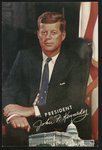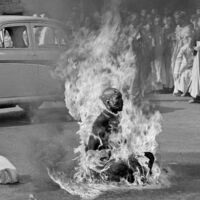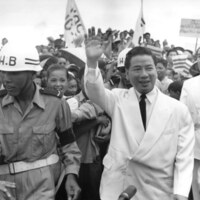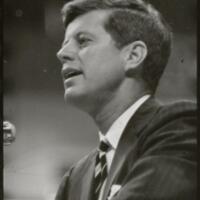President Kennedy and the Vietnam War
By Virginia Vintson
President John F. Kennedy came into office in 1961. From the beginning of his presidency, his administration faced various challenges both at home and on foreign soil. These challenges helped to give birth to the highlights of Kennedy's legacy. For decades after his assassination, individuals continue to praise his policy in the Cuban missile crisis, the civil rights movement, and his work on the nuclear test ban treaty. President Kennedy’s earlier involvement in foreign affairs resulted in events, such as the erection of the Berlin Wall, that cast his policies in a negative perspective. But what about his involvement in Vietnam?
When Kennedy first arrived in office President Dwight D. Eisenhower had already established a political relationship with the Republic of Vietnam in response to rising communist influence in Asia. Kennedy believed in the domino effect, the idea that Vietnam and Laos keeping their independence remained key to preventing the spread of communism throughout Southeast Asia. This mindset informed Kennedy’s policies in Vietnam.
Kennedy maintained that “it was critical for Vietnam to win the war on their own.” Ngo Dinh Diem,President of the Republic of Vietnam (RVN), America’s noncommunist ally, relied heavily on American technology and funding. Kennedy's administration also supplied advisers to teach the Army of Vietnam (ARVN) how to wage counterinsurgency and engage effectively in conventional warfare.
These new counterinsurgency tactics included increased military spending and the Central Intelligence Agency (CIA) supporting ARVN troops. The use of American pilots and herbicides, such as Agent Orang, promoted Kennedy’s hope that the RVN and the Democratic Republic of Vietnam (DRV) settle their political disputes without US ground troops. The strategic hamlet program jointly run by the US and RVN, sought to combat the communist insurgency and reduce its influence on rural populations. The initiative forced entire villages to move into strategic hamlets or fortified areas. Many historians assess the Strategic Hamlet Program as a failure. They cite reasons such as inadequate planning, coordination, and resources. Others suggest the program’s potential by citing the effort that the DRV put forth to subvert the program. They additionally cite the intention of the Hamlets to improve medical treatment and education access to rural Vietnamese. Historians continue to debate its merit. .
Other challenges to Kennedy's efforts involved corruption in Diem’s presidency. Diem and his brother, Ngo Dinh Nhu, devout Catholics, passed multiple policies attacking Buddhist practices. Vietnamese protests of these policies led to Buddhist priests burning themselves alive. The negative press response to these demonstrations targeted Kennedy's administration and resulted in the assassination of President Diem in a successful coup by General Dương Văn Minh
Kennedy only outlived President Diem by three weeks. Lee Harvey Oswald assassinated President Kennedy on November 22, 1963. His death did not stop the US involvement in the Vietnam War. His policies endured, shaping those of presidents Lyndon B. Johnson and Richard M. Nixon who continued to supply funding and troops for an additional 12 years.





